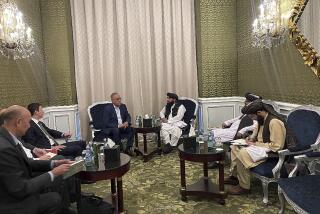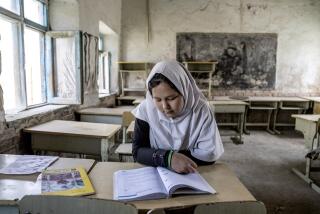3 Women Sent to Meeting on Afghan Rule
- Share via
BONN — Five years of repressive rule by Afghanistan’s fundamentalist Islamic Taliban regime relegated women to the status of chattel and deprived an underdeveloped nation of the talents of more than half its population.
But as the warlords and ethnic chieftains who have fought over Afghanistan for decades gather here for talks Tuesday on the new distribution of power, Afghan women worry that they are still pawns in their men’s fight. Among the 26 participants representing four Afghan groups will be three women: Two were dispatched by the ousted former king, Mohammad Zaher Shah; the third is an exile living in Iran who will speak for the women of the multiethnic Northern Alliance.
Aware that they are tokens, the women say they are watching to see if they have been pulled from under the veil only to appease the Western hosts of the conference. “We’re not starting at zero, but at a huge minus,” said Zaher Shah delegate Rona Mansuri, the daughter of a former prime minister and an activist with Afghan refugees who has made her home in Germany for 33 years. “I hope the fighters and moujahedeen leaders see that they’ve accomplished nothing by waging war and will listen to women’s voices calling for peace and coexistence.”
Women Suffered Even Before Taliban
The status of Afghan women was poor even before the Taliban seized power in 1996, after four years of strife and chaos under a government headed by Burhanuddin Rabbani. It was Rabbani who reimposed Islamic police squads to enforce ancient laws banning women from appearing in public without a male relative.
“With the exception of the king, the previous leaders’ records on human rights and gender issues are all cause for concern,” said Sima Wali, another longtime exile helping in the search for a transitional government. “With Professor Rabbani talking about a willingness to defend the rights of women ‘within the context of Islam,’ we are going to have to watch closely to make sure that all these statements about commitment to gender issues move beyond the rhetorical level.”
As head of the Washington, D.C.-based agency Refugee Women in Development and a founder of the Sisterhood Is Global Institute based in Montreal, Wali is among the most active Afghan advocates of gender equality.
The inclusion of women may be self-serving for the regional chieftains who want more U.S. and other foreign backing, but it also presents an opportunity to get women’s rights moving in the right direction, said Wali, who left her native country 22 years ago when the Soviets invaded.
Afghan schools are gradually resuming teaching girls and young women, ending the Taliban’s ban on educating females older than 8. An edict forbidding women from most workplaces has also been rescinded since the Northern Alliance moved into the Afghan capital, Kabul, on Nov. 13. A few dozen women in Kabul have even shed their burkas, testing the limits of the new regime’s tolerance.
But the prospects for enduring improvement for women are unclear, given the records of the conference’s participants.
The so-called Peshawar group of pro-Pakistani Pushtuns has not only failed to include any women among its delegates but is also not known to have a single woman in its ranks. Likewise, the Cyprus group represents figures who have failed to show much concern for women or children, such as Gulbuddin Hekmatyar, whose bombardment of Kabul in 1994 left more than 25,000 civilians dead.
The third woman called to the conference here, Amina Safi Afzali, was to arrive late today from eastern Iran.
Those representing the former king have taken the lead in championing the rights of women as a way to mobilize support.
“You can’t disenfranchise 54% of the population and not suffer from that loss. That is why we are committed to fully integrating women into the political, economic and social life of Afghanistan,” said Mostapha Zaher, the 37-year-old grandson of Zaher Shah and one of the 11 delegates from what is called the Rome faction.
“Afghanistan has gone through 22 years of war. It’s time for healing and reconciliation, and women have much to contribute to this,” the king’s grandson said. “We must take into consideration Afghan customs and traditions--we can’t change everything in one week, but we must lay the foundation here for these changes.”
Women Granted Rights During King’s Reign
Under the 1964 constitution drafted during Zaher Shah’s reign, women were granted rights to work and take part in social life that have been unheard of for the past decade. Four women then served as Cabinet ministers, and two others were members of the national assembly--a move into public life that accelerated during the 1979-89 Soviet occupation, when many women wore Western dress.
“Afghan women have a great role to play in our society as we saw during the king’s administration and even during the Communist times,” said Aziz Sadat, a 28-year resident of Washington state who was summoned here by Afghanistan’s ethnic Hazara minority to be a Northern Alliance representative.
With no firm agenda and still much uncertainty about what political factions, ethnic groups, religious sects, tribes and fiefdoms will be represented in a new Afghan administration, the plight of Afghan women is unlikely to be a central issue at the talks. Even here, where observers from the United States, Russia, Pakistan and Iran will be on hand to assist the U.N. organizers, the focus is expected to be on naming a governing council of 20-odd members to run Afghanistan until a more legitimate government can be seated. That process, involving the convening of a council of tribal elders known as a loya jirga, followed by preparations for elections to a broad-based national assembly, could take two years.
One issue to be tackled, that of a proposed U.N. police force to keep the peace in Afghanistan in the meantime, is already showing a gender divide. Although Mansuri and Wali said most Afghan women would heartily welcome outside intervention, the factional leaders are strongly opposed.
“We have not been listened to in the past, but people now must decide what they want for the future,” said Mansuri, who came to Germany in the 1960s when her father was Afghanistan’s ambassador here. “What more proof is needed that the ways of the past have been wrong? It’s not only women’s rights that have been broken--the entire country is totally destroyed.”
*
Staff writer Richard Boudreaux in The Times’ Rome Bureau contributed to this report.
More to Read
Sign up for Essential California
The most important California stories and recommendations in your inbox every morning.
You may occasionally receive promotional content from the Los Angeles Times.














